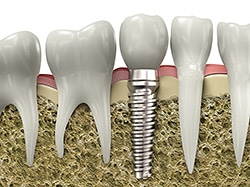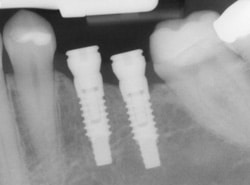DENTAL IMPLANTS
People are living longer than ever, and while regular brushing, flossing, and checkups allow many of us to maintain our natural smiles for a lifetime, sometimes our teeth just can’t keep up. If you’ve lost a tooth (or a few teeth) due to injury or disease, dental implants can rejuvenate both your smile and your oral health.
An implant is a synthetic tooth root in the shape of a post that is surgically placed into the jawbone. The “root” is usually made of titanium: the same material used in many replacement hips and knees, and a metal that is well-suited to pairing with human bone. A replacement tooth is then fixed to the post. The tooth can be either permanently attached or removable. Permanent teeth are more stable and feel more like natural teeth.
The ideal candidate for implants is a non-smoker who has good oral health, including a sufficient amount of bone in the jaw, and healthy gums with no sign of gum disease.
Can I Be Asleep For My Dental Implant Placement?
Although the procedure is completely painless, we realize patients may prefer to be asleep during the implant surgery. We have a working relationship with a board-certified anesthesiologist to come to our office for those patients who would like to be sedated or have general anesthesia (GA). This way, the patient can eliminate the fear and anxiety that is often associated with this procedure and know that they are under the best care possible. This service is available for any dental procedure at Northside Dental Care. Please ask for details.

Single or Multiple Dental Implants
Implants are versatile. If you are only missing one tooth, one implant plus one replacement tooth will do the trick. If you are missing several teeth in a row, a few strategically placed implants can support a permanent bridge (a set of replacement teeth). Similarly, if you have lost all of your teeth, a full bridge or full denture can be permanently fixed in your mouth with a strategic number of implants.
Advantages of Implant-Supported Crowns/Bridges
- Implants often offer more stability than natural teeth, especially in cases where the teeth are weak or the roots have poor bone support
- Implants are not affected by tooth decay like natural teeth, therefore if tooth decay has been a problem in your mouth, implants have a distinct advantage
- In cases where a single tooth is missing, an implant allows the adjacent teeth to remain unaltered as opposed to using them as bridge anchors
- Implants are much easier to clean around than bridges, as bridges connect one or more teeth together and therefore require that the patient clean underneath them
 Implants help preserve the bone in the site of the missing tooth
Implants help preserve the bone in the site of the missing tooth- In most situations, implant-supported restorations outlast conventional crowns and bridges, although each case has unique factors affecting the prognosis
Post-Treatment Care
Consider your replacement teeth to be the same as natural teeth. They require the same daily brushing and flossing, and the same amount of regular checkups. Just like your natural teeth, the better you take care of your replacements, the longer they will last.
Dental Implant Services

- Single tooth implants: This is the most common implant service offered. It is used when a patient is missing a single tooth and requires one preliminary appointment to evaluate the bone volume where the implant will be surgically placed. This evaluation of the surgical site is done both visually and with an X-ray, usually a three-dimensional X-ray called a CBCT.
- Multiple dental implants: In most cases where multiple teeth are missing, it is not required to replace each missing tooth with an implant; rather, a few strategically placed implants can be placed to support a bridge replacing multiple teeth. The process is exactly the same as for a single implant, other than the appointment lasting a bit longer.
- Implant-supported “Overdenture”: Sometimes, a patient may have an existing denture that is unstable while chewing or talking. This is especially common for lower complete dentures. A very simple and cost-effective way to make the denture incredibly stable and more comfortable to wear is to support the denture with two or more implants. Typically the existing denture is modified to “snap” onto special attachments affixed to the implants. That means the denture can still be taken out to clean but is much more stable while eating or speaking. There are many versions of overdentures. The design depends on the amount of bone available for placing implants, the number of implants placed, and of course the patient’s budget.
- Hybrid Denture: A “hybrid” denture is a denture rigidly attached to four or more implants. This type of denture does not move and must be detached from the implants by a dentist. It’s called a hybrid denture because it is very much like a fixed bridge, in that it is permanently attached to implants, but is fabricated with denture teeth and gum-colored (pink) acrylic just like a conventional denture. This type of denture is usually chosen when a patient’s teeth cannot be restored and must all be extracted. During a single appointment the teeth are extracted, the implants are placed, and a temporary version of the hybrid denture is affixed to the implants so the patient can leave the office with brand new teeth in a day. Details about this procedure can be seen on our blog.
- Dental Implant Maintenance: Once your dental implant restoration is completed, it is important to keep the area clean and infection-free. Dental implants can accumulate plaque and tartar just as teeth can. Whether you have just one tooth replaced by an implant or several, a professional cleaning schedule will be necessary to keep your implants healthy. The time interval for these professional cleanings will be determined by your individual needs.

